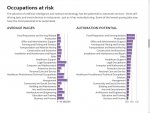- Joined
- Aug 8, 2005
- Messages
- 69,257
- Reaction score
- 53,624
- Location
- Los Angeles
- Gender
- Male
- Political Leaning
- Undisclosed
Those are two awesome examples that are both wonderfully counterintuitive.
Food prep is a good one. There isn’t a lot of buzz behind it yet, but it makes a lot of sense. Fast food jobs don’t pay enough to provide a living wage and the product doesn’t support the prices required to provide a living wage. The preparation is also simple motions that are very consistent and well defined. I could see a Big Mac being made in a ford assembly line today. The real effort would be getting the costs down and reliability up.... and the hmi for the customer. You’re not going to need a ton of additional sensing or adaptation beyond traditional automation to get there.
But even then, the economics are non trivial. Automating an entire kitchen is probably cost prohibitive. Hardware alone would run you million(s?) plus integration and maintenance. So I’d first look to small single manipulator compact units that are more akin to a fast food truck or kiosk. I’d say you’d need 10-50 units before the whole thing becomes revenue neutral (though that’s just a back of the envelope)
House cleaning is a completely different story. That will be one of the last things to be automated, if ever. At this point no one is even remotely close. The problem is orders of magnitude more complex than flipping burgers. Manipulation is extremely difficult, especially when you’re dealing with objects that deform. Try to imagine computing a mathematical model of a shirt that reacts to picking it up and moving it, and then try to morph that model that onto a shirt laying in a pile of clothes so you can predict where you need to grasp it to begin folding.
Economically, even though you’re also dealing with lower paying jobs it’s totally different from a fast food setting. Instead of many consumers interacting with a single robot, you’re talking about robots as an appliance. Even with the rosiest glasses you’re almost certainly looking at 100k+/robot if it were even possible. That’s too much for a single consumer.
Obviously robot vacuums are here now, but improving them is going to be tough. Cordless vacuums aren’t all that great and dragging around a tether (cord) is a huge complexity. And there’s also a paradox here, as the more capable you make a robot the more susceptible it is to exhibiting adverse emergent behaviors.
---You're staring too closely at the individual letters instead of the paragraphs.
1. Hotel room cleaning:
a) First string room supers go through, pick up shirts and other sundries, toiletry stuff, place them out of the way.
b) Robotic cleaning machines sweep through, vacuum, make beds, clean bathrooms,
c) second string goes through, resets rooms.
Minor room design changes make it work. Each room has a no man's land where suitcases, sundries etc can be put during cleaning, same with bathrooms. The same software that makes supermarket self checkout work can be adapted. Remember, we are talking about in ten years, not tomorrow. You can bet this is already being researched.
2. Food prep:
a) Again we are not necessarily talking full automation. A robot chef cannot poach sixteen eggs while basting seven others and make German potato pancakes all at the same time during breakfast rush however a tightly organized crew of helpers can feed the necessary ingredients, start the bots on a task and then come back through and finish.
b) Bots can also do the sidework, prepping for instance. Any bot can par-boil a pot of potatoes and then peel 300 pounds of them for the day and also prep corn, open cans, mix batters, make sauces and gravies, flip steaks and pancakes.
Some kitchen redesign will be required.
Again, we are talking a decade down the road or thereabouts so economies of scale are in play. It's not tomorrow.
---You present incredibly discerning questions, the kind which industry researchers are no doubt chewing on as we read this.
Now let's do warehousing, which thanks to Amazon and Walmart, are already well on the way to automation.

